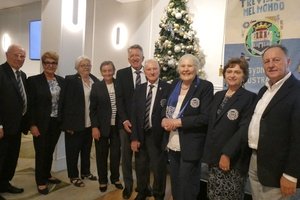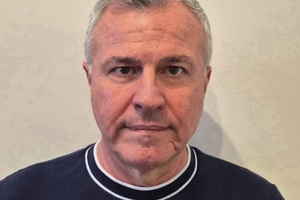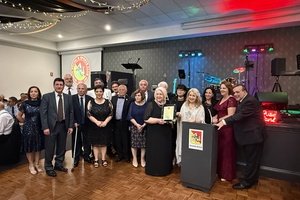His journey across the country began in Queensland and concluded in Victoria, with stops in Sydney and Canberra.
Giordano first gained international recognition with his novel The Solitude of Prime Numbers, which won Italy’s prestigious Strega Prize in 2008, making him the youngest recipient of the award.
Over the years, his literary journey has delved into the complexities of modern life: from the struggles of soldiers returning from Afghanistan in The Human Body, to the intricacies of relationships in Like Family and the COVID-19 crisis via In Times of Contagion.
With his latest novel Tasmania, Giordano returns to fiction, embarking on a special tour to Australia in celebration of the English release of the book.
Last Thursday, October 31, he shared insights into his work at the William MacMahon Ball Theatre at The University of Melbourne, with a captivated audience in attendance.
Among the guests were Chiara Mauri, the Italian Consul General in Melbourne; Professor John Hajek, who introduced the event; and Professor Andrea Rizzi, who moderated the discussion.
Curiously, the author’s journey to Australia did not include Tasmania itself, the untouched island that not only gives his novel its title but also serves as a symbolic final destination for the protagonist.
“Today is actually our last day in Australia, and we’ll be flying out late tonight,” Giordano said with a smile.
“Originally, we planned to end the tour in Tasmania, but that didn’t quite feel right.
“I’m a bit superstitious about things like this and felt it might bring bad luck.
“So, we decided to leave Tasmania as it is imagined in the book - a real place but also a metaphor for an island of salvation, maybe even a paradise on earth.”
In the novel, Tasmania seems like a distant, almost mythical place, occasionally brought to life through the protagonist’s reflections, such as when he says, “My parents send me postcards as if I live in Australia.”
The protagonist of Tasmania is a writer dealing with the collapse of his imagined future. His wife has given up on trying to have a child after years of effort, though he clings to the hope of fatherhood.
Their marriage is strained, but he throws himself into work, travelling to Paris to attend the UN Climate Conference, held just a month after terrorist attacks shook the city and the world. The story unfolds in late 2015.
“The original idea was to start the story in November, 2015, a unique time in Europe, particularly in Paris, where I spent a lot of time,” Giordano explained.
“I started rereading WhatsApp messages and emails from that period, listening to the music I’d had on repeat back then.
“There was a lot of Nick Cave in my life, especially the track Ghosteen, which speaks to the loss of his son. To me, it’s a masterpiece of contemporary music.
“That song came at a specific moment for me. My wife and I had just realised we wouldn’t be having children. It felt like a personal failure, if I may put it that way, and that became the inspiration for the novel.
“I was nearly 40 when I suddenly understood I’d never become a father. I clung to the idea of a future, imagining what might come next.”
The central question driving the story is, ‘If the world ended tomorrow, where would we go?’
The protagonist, travelling through Europe and Japan, encounters a cast of characters, each seeking their own Tasmania, a safe haven amid global crises like climate change, pandemics and political unrest.
As a doctor of theoretical physics, Paolo Giordano admits to holding a “slightly pessimistic” view.
“The truth is, we know nothing,” he said.
“It may even be impossible to find a place of pure, untouched nature anymore.
“As a physicist, I’m fascinated by the concept of ‘nature’, which is a human construct. If we scientifically rewind time, it’s hard to imagine a perfectly natural place.
“Yet, it’s the most powerful ideology we have today - this frantic search for an unaltered natural world.”










